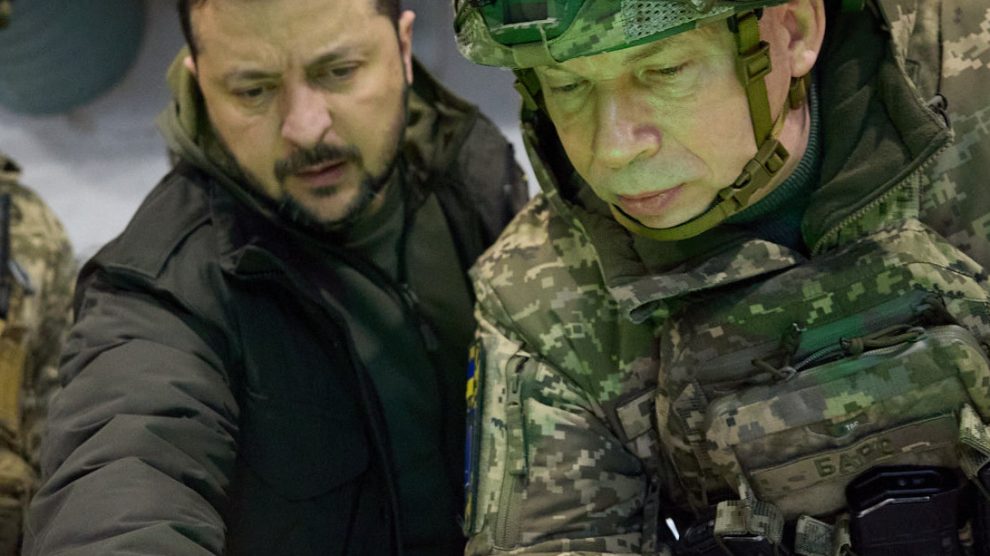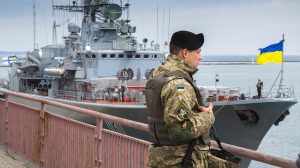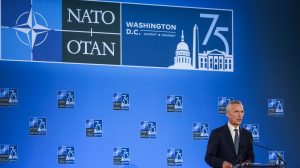Catch up quickly with the stories from Central and Eastern Europe that matter, this week led by news of the ‘extremely complex’ situation on the front line in Ukraine.
Russia’s war on Ukraine
Ukraine’s new army chief said on Wednesday the situation on the front line was “extremely difficult” as delays to much-needed US military aid cast a shadow over how long Kyiv’s troops can hold out.
The 1,000-kilometre front line has barely moved in more than a year, with Kyiv’s forces back on the defensive after last year’s failed counter-offensive and military leaders acknowledging Russia has a manpower advantage.
The warning came even as Kyiv said it had destroyed another Russian warship in the Black Sea, the latest in a string of successful attacks on Russia’s naval fleet.
“The operational environment is extremely complex and stressful. The Russian occupiers continue to increase their efforts and have a numerical advantage in personnel,” commander-in-chief Oleksandr Syrsky (pictured above with Volodymyr Zelensky) said.
Syrsky was conducting his first visit to the front line since he replaced the popular Valery Zaluzhny last week in a major military shake-up.
Ukraine will produce thousands of long-range drones capable of deep strikes into Russia in 2024 and already has up to 10 companies making drones that can reach Moscow and St Petersburg, Ukraine’s digital minister said this week.
Mykhailo Fedorov spoke about the wartime drone industry he has championed in a interview in Kyiv in which he revealed new details about the sector, after a spate of Ukrainian drone attacks on Russian oil facilities in recent weeks.
“The category of long-range kamikaze drones is growing, with a range of 300, 500, 700, and 1,000 kilometres. Two years ago, this category did not exist … at all,” he told Reuters.
Fedorov, 33, has been at the heart of Ukraine’s effort to nurture private military startups to innovate and build up the drone industry as the war goes into its third year and Ukraine seeks new ways to fight back against well dug-in Russian forces.
The recent series of strikes on oil facilities, he said, reflected the government’s progress in rapidly deregulating the drone market and increasing funding for it, with the state acting as a venture investor.
Russia’s war on Ukraine has now caused 152 billion US dollars in direct damage to buildings and infrastructure, a major new report claimed this week.
The most affected sector is housing (almost 56 billion US dollars, or 37 per cent of total damage). Across the country, 10 per cent of the housing stock has been damaged or destroyed, prolonging the displacement of Ukrainians from their communities.
Other sectors impacted include transport (almost 34 billion US dollars, or 22 per cent), commerce and industry (almost 16 billion US dollars, or 10 per cent), energy (almost 11 billion US dollars, or seven per cent), and agriculture (10 billion US dollars, or seven per cent).
The figures were made public on February 15 with the publication of the World Bank’s latest Ukraine Damage and Needs Assessment, the third such report —undertaken jointly with the government of Ukraine, the European Commission, and the United Nations and supported by other partners—which takes stock of almost two years of the war, estimating damage and losses along with recovery and reconstruction needs for 10 years.
The report also shows that as of December 31, 2023, recovery and reconstruction needs are estimated at almost 486 billion US dollars considering an (ambitious) 10-year period to meet them.
Other news from the region
Hungary’s president was forced to resign on Saturday amid controversy over her pardoning of a man convicted in a child sexual abuse case. President Katalin Novak faced days of growing pressure to resign because she decided to pardon a man who was convicted of covering up crimes committed by a sexual predator at a children’s home. The 46-year-old announced in a televised message that she would step down from the presidency, an office she has held since 2022. “I issued a pardon that caused bewilderment and unrest for many people,” Novák said. “I made a mistake.”
Russia has put the prime minister of Estonia, Kaja Kallas, on a wanted list, the first time the Kremlin has sought criminal charges against a foreign leader since it launched its full-scale invasion of Ukraine. Kallas is listed as wanted in the Russian interior ministry’s database of suspects, independent news site Mediazona reported on Tuesday, alongside other Baltic politicians critical of the Kremlin and its war, including Lithuania’s culture minister and dozens of lawmakers in Latvia. The Estonian PM called the Russian move “nothing surprising” and said, “This is yet more proof that I am doing the right thing.”
Thousands rallied on Monday in northern Kosovo to protest a ban that prohibits the use of the Serbian dinar currency in places where the country’s minority Serb population lives. The decision has angered both Kosovo Serbs and Serbia. The ban, which requires that the euro be used instead, is the latest spat in ongoing tensions between Serbia and Kosovo, a former Serbian province. Kosovo banned banks and other financial institutions from using the dinar on February 1. Participants in Monday’s rally called the decision to abolish the dinar discriminatory.
A journalist for Poland’s state broadcaster has apologised for his channel’s “shameful” role in spreading anti-LGBT+ sentiment. Host Wojciech Szeląg said this week that LGBT+ people had been targeted for “years” by “hateful words”. The channel, TVP Info, was criticised as a mouthpiece of the previous governing Law and Justice (PiS) party. Introducing the Guest of the Evening show on Sunday, Szeląg told two activists, Bart Staszewski and Maja Heban: “LGBT+ people are not an ideology, but people: specific names, faces, loved ones and friends.”
North Macedonia’s parliament speaker on Wednesday formally set early parliamentary and presidential elections in the spring as the country makes a bid to join the European Union. Following opposition pressure, North Macedonia’s main political parties agreed in December to organise general elections on May 8, two months early. A caretaker government was appointed last month. Whoever forms the next government will face pressure from the European Union to approve unpopular constitutional changes as part of the country’s bid to join the bloc.
A Czech court on Wednesday acquitted for the second time former Prime Minister Andrej Babiš of fraud charges in a two million US dollars case involving European Union subsidies. Babiš had pleaded not guilty and repeatedly said the charges against him were politically motivated. The prosecution can still appeal the verdict. It had requested a three-year suspended sentence and a fine to be paid by the populist billionaire. Prague’s Municipal Court previously acquitted Babiš last year in January. In September, Prague’s High Court canceled the lower court’s decision.
Bulgaria is insisting on a fixed price for the construction of two new Westinghouse AR-1000 nuclear reactors, which should not exceed 14 billion US dollars, according to an intergovernmental agreement on nuclear cooperation between Bulgaria and the US signed in Sofia on Monday night. The new reactors will be built on the banks of the Danube, where the Kozloduy nuclear power plant is currently located. They will operate in parallel with the two Russian reactors until 2050. After 2050, the old Russian reactors will be decommissioned.
Several countries in southeastern and central Europe have begun working together to create a new gas transit route to help compensate for the loss of Russian gas exports to Europe. If realised, the ‘Vertical Corridor’ would offer Azerbaijan a new route to export its gas to east and central European markets and could help Baku to meet its pledge to the EU to double its gas exports to Europe to 20 billion cubic meters a year by 2027. The planned new route would mainly utilise existing pipelines connecting Greece, Bulgaria, Romania, Moldova and Ukraine but would require capacity expansion of some sections.
Photo: Ukrainian President Volodymyr Zelensky with military chief Oleksandr Syrsky. (President of Ukraine/CC0 1.0)
Unlike many news and information platforms, Emerging Europe is free to read, and always will be. There is no paywall here. We are independent, not affiliated with nor representing any political party or business organisation. We want the very best for emerging Europe, nothing more, nothing less. Your support will help us continue to spread the word about this amazing region.
You can contribute here. Thank you.







Add Comment